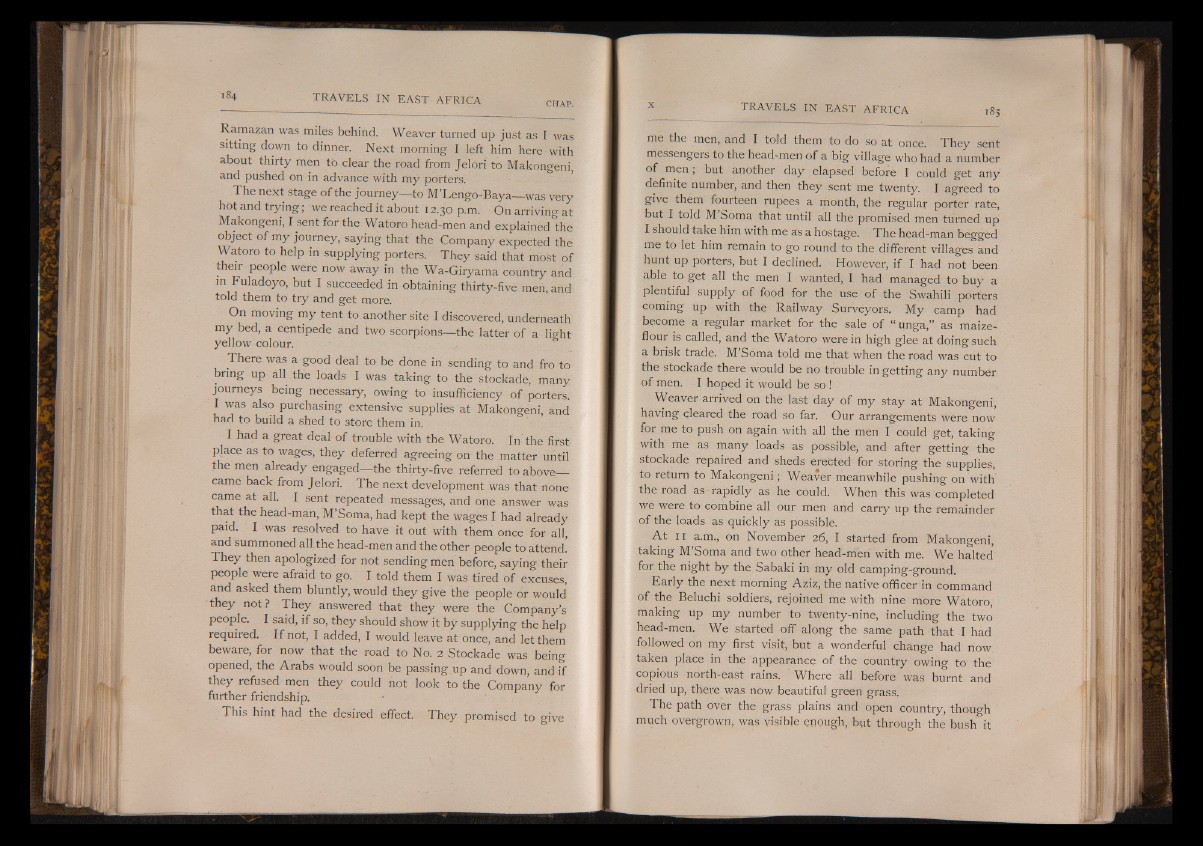
Ramazan was miles behind. Weaver turned up just as I was
sitting down to dinner. Next morning I left him here with
about thirty men to clear the road from Jelori to Makongeni,
and pushed on in advance with my porters.
The next stage of the journey— to M’Lengo-Baya— was very
hot and trying; we reached it about 12.30 p.m. On arriving at
Makongeni, I sent for the Watoro head-men and explained "the
object of my journey, saying that the Company expected the
Watoro to help in supplying porters. They said that most of
their people were now away in the Wa-Giryama country and
in Fuladoyo, but I succeeded in obtaining thirty-five men, and
told them to try and get more.
On moving my tent to another site I discovered, underneath
my bed, a centipede and two scorpions— the latter of a light
yellow colour.
There was a good deal to be done in sending to and fro to
bring up all the loads I was taking to the stockade, many
journeys being necessary, owing to insufficiency o f porters.
I was also purchasing extensive supplies at Makongeni, and
had to build a shed to store them in.
I had a great deal of trouble with the Watoro. In the first
pjace as to wages, they deferred agreeing on the matter until
the men already engaged— the thirty-five referred to above_
came back from Jelori. The next development was that none
came at all. I sent repeated messages, and one answer was
that the head-man, M’Soma, had kept the wages I had already
paid. I was resolved to have it out with them once for all,
and summoned all the head-men and the other people to attend.
They then apologized for not sending men before, saying their
people were afraid to go. I told them I was tired of excuses,
and asked them bluntly, would they give the people or would
they not? They answered that they were the Company’s
people. I said, if so, they should show it by supplying the help
required. I f not, I added, I would leave at once, and let them
beware, for now that the road to No. 2 Stockade was being
opened, the Arabs would soon be passing up and down, and if
they refused men they could not look to the Company for
further friendship.
This hint had the desired effect. They promised to give
me the men, and I told them to do so at once. They sent
messengers to the head-men of a big village who had a number
of men, but another day elapsed before I could get any
definite number, and then they sent me twenty. I agreed to
give them fourteen rupees a month, the regular porter rate,
but I told M’Soma that until all the promised men turned up
I should take him with me as a hostage. The head-man begged
me to let him remain to go round to the different villages and
hunt up porters, but I declined. However, if I had not been
able to get all the men I wanted, I had managed to buy a
plentiful supply of food for the use of the Swahili porters
coming up with the Railway Surveyors. My camp had
become a regular market for the sale of “ unga,” as maize-
flour is called, and the Watoro were in high glee at doing such
a brisk trade. M Soma told me that when the road was cut to
the stockade there would be no trouble in getting any number
of men. I hoped it would be so !
Weaver arrived on the last day of my stay at Makongeni,
having cleared the road so far. Our arrangements were now
for me to push on again with all the men I could get, taking
with me as many loads as possible, and after getting the
stockade repaired and sheds erected for storing the supplies,
to return to Makongeni; Weaver meanwhile pushing on with
the road as rapidly as he could. When this was completed
we were to combine all our men and carry up the remainder
of the loads as quickly as possible.
A t 11 a.m., on November 26, I started from Makongeni,
taking M’Soma and two other head-men with me. We halted
for the night by the Sabaki in my old camping-ground.
Early the next morning Aziz, the native officer in command
of the Beluchi soldiers, rejoined me with nine more Watoro,
making up my number to twenty-nine, including the two
head-men. We started off along the same path that I had
followed on my first visit, but a wonderful change had now
taken place in the appearance of the country owing to the
copious north-east rains. Where all before was burnt and
dried up, there was now beautiful green grass.
The path over the grass plains and open country, though
much overgrown, was visible enough, but through the bush it